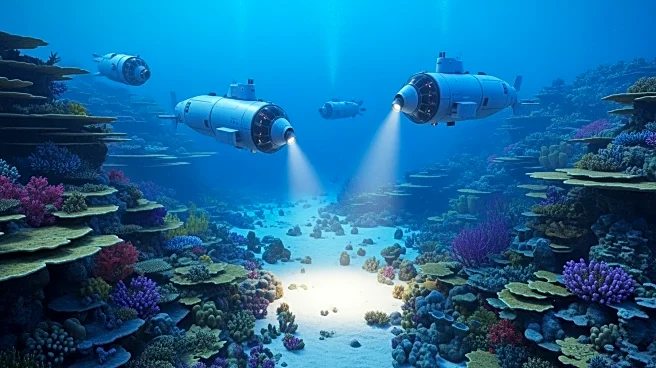What's Happening?
PlanBlue has announced a strategic partnership with Bedrock Ocean Exploration to advance seafloor intelligence through the integration of AI-driven analytics and autonomous survey technology. This collaboration
aims to transform raw ocean data into actionable insights, supporting infrastructure development, maritime security, coastal resilience, and environmental stewardship. PlanBlue's hyperspectral imaging technology provides detailed environmental insights, including ecosystem health and biodiversity, while Bedrock's fleet of autonomous underwater vehicles (AUVs) captures high-resolution bathymetry with minimal environmental impact. The partnership promises enhanced speed and cost-efficiency in environmental monitoring and related applications, offering clients in sectors such as offshore wind and subsea cable routing access to critical information more efficiently.
Why It's Important?
The partnership between PlanBlue and Bedrock Ocean Exploration is significant for several reasons. It represents a major step forward in sustainable marine development, providing industries with the tools to make informed decisions that minimize environmental impacts. By combining advanced AI analytics with autonomous survey capabilities, the collaboration enhances the ability to monitor and protect marine ecosystems while supporting infrastructure projects. This initiative aligns with global efforts, such as the UN Decade of Ocean Science, to promote healthier oceans and sustainable practices. Industries involved in offshore wind, port development, and maritime security stand to benefit from faster, cleaner, and more reliable data, potentially reducing risks and improving operational efficiency.
What's Next?
The partnership is expected to drive progress in marine development by offering scalable, high-fidelity ocean intelligence. As both companies continue to integrate their technologies, clients can anticipate more rapid deployment of new capabilities and payloads. This collaboration may lead to further innovations in environmental monitoring and infrastructure assessments, potentially influencing policy and industry standards. Stakeholders in marine industries are likely to monitor the outcomes closely, as the partnership could set new benchmarks for ecological responsibility and operational effectiveness in ocean exploration and development.
Beyond the Headlines
This collaboration highlights the growing importance of technology in addressing environmental challenges. The integration of AI and autonomous systems in marine exploration not only enhances data accuracy but also reduces the ecological footprint of such activities. The partnership underscores a shift towards more sustainable practices in ocean development, reflecting broader trends in environmental responsibility and technological innovation. As industries increasingly prioritize ecological considerations, partnerships like this may become more common, driving long-term shifts in how marine resources are managed and utilized.











